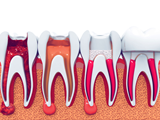Are root canals really safe for long-term health?
If you ask a room full of dentists about root canals, you’ll get the same kind of unanimous nodding you’d expect if you asked if flossing is important. It’s dental gospel: root canals save teeth. But what if the story isn’t so clean-cut? What if saving that tooth is just the beginning of another, much less visible problem? Biological dentists have been asking this question for years, and their findings are unsettling.
A procedure frozen in time
Here’s the thing about root canals, they haven’t really changed all that much since they were first introduced. Sure, the technology is fancier, the anesthesia more effective, but the basic concept is the same: drill out the infected pulp, clean the canals, and seal it up like a tomb. The tooth is dead, preserved, and left to coexist with living tissue like a perfectly embalmed mummy. And that’s precisely the problem, according to biological dentistry.
Biological dentists argue that you can’t just leave dead tissue in the body and expect things to go smoothly. Anywhere else in medicine, if tissue dies, it’s removed. Gangrene in your foot? Amputate. Necrosis in your liver? Resect. But in the mouth? We fill it, crown it, and call it a day.
The problem beneath the surface
The concern isn’t just theoretical. Studies have shown that root-canaled teeth can harbor bacteria. Lots of it. We’re talking anaerobic bacteria, the kind that doesn’t need oxygen and thrives in dark, sealed spaces. The problem is that these bacteria don’t stay put. They release toxins that can leach out through the tooth’s microscopic tubules, some 3 to 5 miles of them in a single tooth, and enter the bloodstream. Biological dentists claim that this constant, low-grade bacterial exposure can contribute to systemic inflammation and chronic health issues.
Now, maybe you’re thinking, ‘Come on, aren’t we sterilizing the canals? Isn’t that what the bleach solution is for?’ Yes, but it’s not perfect. In fact, the complexity of the root canal system, the twists, turns, and micro-fissures, means it’s nearly impossible to fully disinfect. It’s like trying to clean out a sponge with a toothpick.
The body keeps score
Biological dentistry takes a whole-body approach to oral health, treating teeth not as isolated structures but as interconnected with every organ system. In this framework, a root-canaled tooth isn’t just a relic of infection, it’s a potential source of ongoing toxicity. And the effects can be far-reaching. Biological dentists often point to correlations between root canals and diseases like heart disease, arthritis, and autoimmune conditions. Is it causation? That’s still up for debate. But the correlations are enough to raise eyebrows, and questions.
Dr. Weston A. Price, a pioneer in biological dentistry, conducted studies as far back as the 1920s showing a link between root-canaled teeth and chronic illness. His research was buried, dismissed as fringe science. Yet nearly a century later, biological dentists are dusting off his work and finding eerie parallels in modern patients.
The patient paradox
Patients often feel fine. They walk out of the endodontist’s office, the pain gone, the infection handled, or so it seems. Months or years later, they might develop unexplained fatigue, joint pain, or autoimmune flare-ups. The connection to their root canal? Invisible. It’s the kind of medical detective work that often goes unsolved, because who traces a case of rheumatoid arthritis back to a molar?
Biological dentists argue that conventional dental wisdom glosses over this possibility. Their approach isn’t just about treating teeth, it’s about understanding the broader health implications of keeping dead tissue sealed inside the body. And their solution? Extraction, detoxification, and often replacement with a biocompatible implant or bridge. To them, it’s not radical, it’s common sense.
Rethinking the standard of care
Does this mean every root canal is a ticking time bomb? Not necessarily. Many patients go their entire lives with root-canaled teeth and no apparent issues. But isn’t it worth asking the question? Shouldn’t we at least be exploring biological alternatives: ozone therapy, laser disinfection, or perhaps a complete rethinking of how we approach infected teeth?
Biological dentistry doesn’t claim to have all the answers, but it’s certainly asking the right questions. And if the idea of leaving dead tissue sealed in a living body seems counterintuitive, maybe that’s because it is. Perhaps it’s time to revisit what we consider standard practice, before ‘saving’ a tooth leads to sacrificing something far more important.
After all, maybe the real question isn’t whether root canals work, it’s whether they work for the rest of your body.
Dental Clinics Near You
Book a Dental Treatment
Our Smylor dental marketplace allows you to review and request bookings from 100s of dentists near you. Currently available in Switzerland (Zürich & Zug) and Germany (Köln, Düsseldorf and Bonn).
Click on your region.


